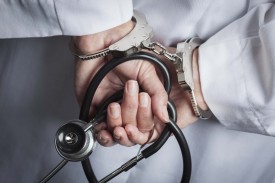February 6: The Week That Was in Healthcare Fraud and Legality
A recap of high-profile charges, convictions and sentencing involving healthcare fraud ending the week of February 6, 2015.
- The United Stated Department of Justice has put a stop to a number of different high-value healthcare scams and charged, convicted or sentences several physicians, executives and companies. The charges resulted in multiple millions of dollars in fraud and months or years in jail.

Here is a roundup of some of the legal dealings from the past week.
Hospital Pays $75 Million for False Claims
The Community Health Systems Professional Services Corporation (CHSPSC) and three affiliated New Mexico hospitals have reached a settlement to pay $75 million to rectify allegations they violated the False Claims Act. This happened by making illegal donations to county governments which was used to fund the state share of Medicaid payments to hospitals. This happened between August 1, 2000 and December 31, 2010.
“Congress expressly intended that states and counties use their own money when seeking federal matching funds in order to encourage them to join the federal government in ensuring that Medicaid funds are spent on the needs of beneficiaries,” said Acting Assistant Attorney General for the Justice Department’s Civil Division Joyce Branda. “When private hospitals violate the rules against hospital donations funding the state share, that important protection of the Medicaid program is destroyed.”
Former Health Clinic CEO Arrested on 112-Count Indictment
Federal agents in Alabama arrested Jonathan Wade Dunning, the former CEO of two non-profit health clinics that cater to the poor and homeless. He was arrested on a 112-count indictment that stems from a seven-year conspiracy, wire fraud, bank fraud and money laundering.
Through this scheme, Dunning and the two clinics received millions of dollars in federal grant money through the Health Resources and Services Administration (HRSA) to further their stated mission of providing healthcare services to underserved population.
Ten Year Prison Term for Home Health Agency Owner
Ernesto Fernandez, the former owner of Professional Medical Home Health, plead guilty on November 26, 2014, for his role in a $6.2 million medicare fraud scheme. The home health provider routinely charged Medicare for expensive physical therapy and home health services that were not medically necessary or were not provided at all. Fernandez also admitted to being paid kickbacks as a patient recruiter for his home health service.
For his role in the scheme, Fernandez was sentenced to 10-years in prison and ordered to repay $2,163,057 and forfeit $9,061,867, which represents the proceeds traceable to his criminal conduct. Two co-conspirators were also sentenced to two-years in prison.
Clinic Pays $1.6 Million for Overbilling
Ageless Men’s Health will pay $1.6 million to the federal government to resolve allegations that it billed Medicare and Tricare for medically unnecessary evaluation and management services while administering testosterone replacement therapy shots. Reimbursement of Medicare and Tricare is only provided on procedures that are medically necessary, which testosterone shots do not fall under.
“This settlement demonstrates our commitment to ensuring that Medicare and Tricare funds are not siphoned off by companies more concerned with bottom line profits than legitimate patient care,” stated a U.S. Attorney. “Together with our law enforcement partners, we will continue to make enforcement of the False Claims Act a priority.”
Twenty-Four Doctors Pleaded Guilty in Massive Scheme
Thirty-five defendants, including 24 doctors, have pleaded guilty to their role in an elaborate bribery scheme. The plan involved bribes (which totaled millions of dollars) in exchange for test referrals that resulted in more than $100 million in payments to the Biodiagnostic Laboratory Services from Medicare and various private insurance companies.
